All About Power Generator
Tired of the noise and smog of megacities, townspeople are increasingly leaving cramped city apartments and moving to spacious country cottages closer to the forest, river, clean air, and it turns out that without electricity modern life is unthinkable. We can no longer do without refrigerators, air conditioners, computers, washing machines, chargers for cell phones and other household appliances, but the capacity of the old centralized power supply lines does not always correspond to the increased load, and often the electricity has not been brought to the site at all. So that the life of a country house does not freeze even for a moment, even during its design, prudent homeowners provide for an autonomous gasoline, diesel, gas electricity generator or other independent source of electricity. The article will tell you in which cases it is worth choosing a particular power generator and whether a home-made power generator will help to significantly save on energy.
Content
- Types of Autonomous Energy Generators
- Petrol electricity generator
- Domestic diesel engine
- Gas economical installation
Types of Autonomous Energy Generators
No matter how far from civilization a country house or cottage is located, electricity will create the most modern attributes of comfort in it: uninterrupted water supply and the operation of household appliances, central heating, communication with the outside world. And within the city, an electric generator set in the house will save you from such troubles as a power outage during technological accidents or natural disasters.
Thus, an autonomous electric power generator is a mechanism that converts mechanical, thermal, or any other energy into electrical energy. All electric generators consist of a fuel-burning engine mounted on the same frame and a generator to which the engine transmits torque through a mechanical transmission. Power plants operate with a high efficiency close to 95%, produce electrical energy by burning fuel and transmitting the generated mechanical energy to the generator, and differ in the type of engine and the type of electric current produced.
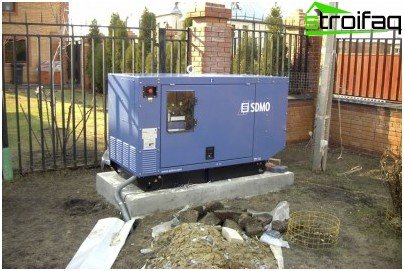
Autonomous stationary power generator
Depending on the type of current produced, electric generators are:
- single-phase with an output voltage of 220 volts and a frequency of 50 hertz;
- three-phase, which corresponds to a voltage of 380 volts at a frequency of 50 hertz.
These initial parameters of the power supply network can ensure the smooth operation of all types of household electrical appliances and power tools.
Depending on the type of engine and the initial type of fuel or energy source used, an independent electric generator can be:
- petrol;
- diesel;
- gas;
- working on alternative energy sources: sun, wind, water;
- fuelless power generator.
Petrol electricity generator
Gasoline electric generators are widely used for emergency supply of electricity to cottages, country houses and cottages in cases of disconnection of stationary power supply, as well as for local lighting of open house, automobile or trading platforms. Gasoline generator sets are almost never used as independent permanent power sources, since their rated power rarely exceeds 20 kW.
Autonomous gasoline electric generators operate mainly on AI-92 gasoline; in some cases, AI-76 or AI-92 fuel with the addition of oil can be used. Gasoline electricity generators are produced in the following versions:
- stationary;
- mobile;
- portable.
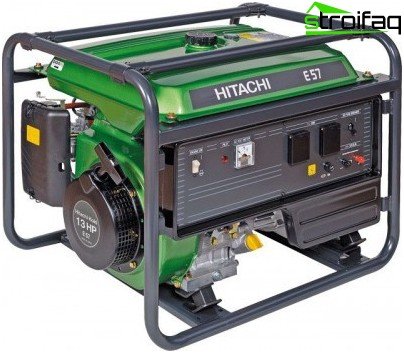
Portable petrol electricity generator
Imported gasoline generator sets are adapted to domestic brands of fuel and, along with domestic ones, are used to start and ensure stable operation of engines in extreme low temperature conditions. Depending on your needs, you can choose a gasoline generator with a starter or manual start, with an enlarged or standard fuel tank, as well as in an open version or in a sound-absorbing casing.
Domestic diesel engine
Owing to a wide range of power from 2 kW to 3 MW, a domestic autonomous diesel generator can be used both as a backup and as the main source of power for a country house, cottage or any other object. Diesel electric generators are produced in the following performance:
- stationary;
- mobile;
- open;
- in the container;
- in soundproof cover.
Diesel generating sets, equally domestic and imported, are adapted to domestic and European standards of diesel fuel, and their advantages include:
- low fuel consumption;
- low noise level;
- low emission of harmful combustion products.
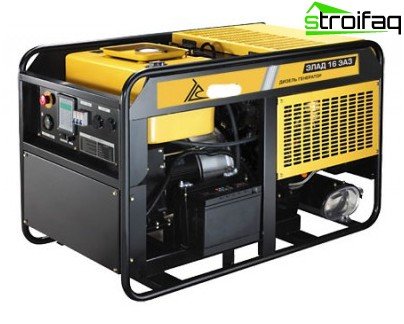
A diesel generator is the best option, perfectly coping with the power supply of a private house
Modern diesel electric generators are equipped with video surveillance devices, control and management of the process of generating electric energy, indicators of the quality of the electric current at the output, the ability to synchronize the operation of several generators in the network, devices for their automatic start and stop. Today, diesel electric generators remain the most popular devices for uninterrupted power supply of residential individual houses and small industries.
Gas economical installation
In gas generating units, any natural, industrial, associated gas is used as fuel, as well as a propane-butane bottled gas mixture. A wide range of passport power of gas generating devices from 20 kW to 2 MW determines the widest range of their application as sources of emergency and permanent power supply of residential country houses, commercial, industrial and any other objects.
To ensure trouble-free operation of the gas generator unit at the design stage, it is necessary to provide forced ventilation and an exhaust gas removal system from the room where the installation will be located.
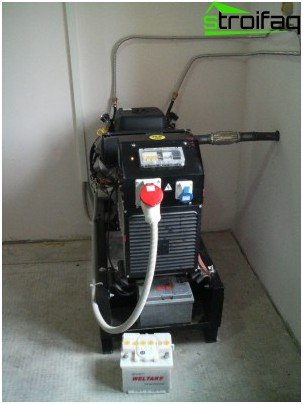
To ensure trouble-free operation of the gas generator unit, it is necessary to provide forced ventilation and a system for exhaust gas from the room
Compared with gasoline and diesel counterparts, a gas generator has the following advantages:
- low price and higher environmental friendliness of gas as a fuel;
- increased engine life: during gas combustion, solid combustion products are not formed, leading to rapid wear of engine parts;
- generator life: gas does not cause corrosion of metal parts of the device.
Due to these advantages, as well as the possibility of adapting to gas a gasoline engine, gas is still the most efficient type of fuel for stand-alone generators. With equal power, the efficiency of the gas generator is twice as high compared to gasoline and diesel counterparts even when using liquefied gas, and when connected to the main gas supply, this indicator increases by 15-17 times.
Do-it-yourself electricity generator
In an effort to live in harmony with nature and save on energy costs that are constantly growing in price, more and more homeowners are trying to create a power generator with their own hands, using the many years of experience of scientists and modern innovative technologies. You can be skeptical about solar panels, wind generators of electricity, private mini-hydroelectric power stations and a person’s hope that they can invent, if not a perpetual motion machine, then at least an autonomous fuel-free generator of electricity, but the listed devices can save a lot if not completely.
Wind power generators
In the CIS, wind turbine generators have not yet received proper distribution, but in Denmark they became the most important person in the state program for energy conservation and providing the mill with electricity.
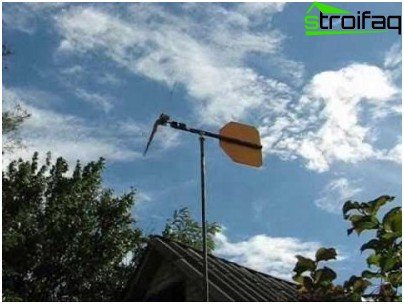
Homemade Electricity Wind Generator
It is not difficult to create such an asynchronous stationary generator of electricity with your own hands, and in windy coastal or mountainous areas it can very well cover the electricity demand of a small private house. The principle of operation of the wind generator is based on the fact that the engine runs on wind energy and starts the generator, and the electricity received from it is then accumulated in special batteries and then distributed according to purpose.
Solar Power Generators
This kind of electric power generators is increasingly used in private and multi-family houses of sunny southern cities, but the latest models of solar panels are already able to convert into electric energy and indirect sunlight, and therefore in the near future, solar energy will come to the houses of northern cities. The disadvantages of solar panels include their high cost and the presence of a sufficiently large area for installation, and therefore they are often used only for heating water.
Fuelless Electricity Generator
It was possible that the Georgian inventor Kapanadze, who created the first fuel-free electric generator, was able to realize the long-held dream of mankind about the perpetual motion machine. The essence of the invention boils down to the fact that the device starts from any source of electricity, and, having entered a resonance, turns into a kind of static electricity generator that extracts static electricity from the environment through two separated grounding conductors.

Despite the popularity of the idea, an industrial design of a fuel-free generator has not yet been created
Despite the enormous popularity of the idea, an industrial design of a fuel-free generator has not yet been created, and therefore its effectiveness has not yet been appreciated. The author of the invention is confident that the device will be used in future in electric vehicles, electric vehicles, as well as a stationary source of household electricity or static charges for various purposes.
When thinking about how to make an electricity generator yourself, do not forget that implementing any idea you like to get electricity in an unconventional way requires significant upfront costs. True, if successful, they can pay off in 3-5 years, and possibly earlier. Everyone must decide for himself whether to buy a generator from a well-known manufacturer or create it yourself, but one thing is obvious – the house must be provided with a reliable source of electricity in case of any unexpected force majeure circumstances.






